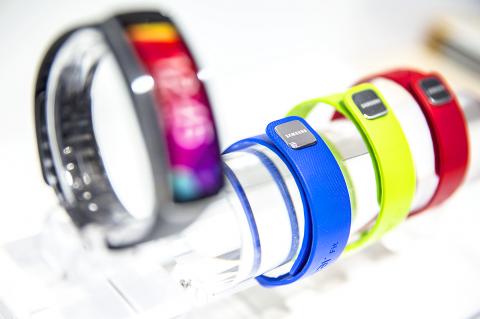Intel Corp plans to use wearable gadgets such as smartwatches to monitor patients with Parkinson’s disease and collect data that can be shared with researchers.
On Wednesday, the chipmaker said it is teaming up with the Michael J. Fox Foundation, established by the actor and Parkinson’s sufferer in 2000, to conduct a multi-phase research study of the neurodegenerative brain disease. An estimated 5 million people globally have been diagnosed with Parkinson’s, the second-most common neurodegenerative disease after Alzheimer’s.
The initial goal is to determine the feasibility of using wearable devices to monitor patients remotely and store that data in an open system that can be accessed by scientists.

Photo: Bloomberg
In the next phase of the study, which is likely begin in the fall, the foundation is to set aside funds to explore how patients are responding to medication. Participants are to be monitored via an array of wearable devices.
“As more of these devices hit the market, we can collect objective measurements and determine the efficacy of new therapeutics,” senior vice president for research partnerships at the foundation Sohini Chowdhury told reporters.
Clinical trials have been far too “subjective” in the past, she said. For example, a patient might inform her doctor that she felt a tremor for several minutes, when it actually lasted a matter of seconds. In the future, Chowdhury hopes patients and their doctors could have more precise measurements via wearable devices about the “frequency and severity” of symptoms.
Chowdhury said the foundation would continue to raise funding to cover the costs of providing wearable devices to patients.
By using such devices, the foundation and other research groups can tap into a broader pool of patients for clinical trials, Chowdhury said. Today, many people with Parkinson’s disease are unable to participate in clinical trials because they do not live near a research facility.
However, wearable devices offer a convenient way to track patients from their work or homes, allowing people in rural parts of the US to participate.
As it expands beyond the PC arena, Intel hopes to capture a share of the growing market for big data analytics and wearable devices in the health sector.
Intel’s Big Data Solutions group general manager Ron Kasabian said the data center and “Internet of Things” business units are exploring the sector.
“We are exploring how to pull data out of devices in real-time,” he said. “We can mine data to improve research, and better understand the behaviors and progression of the disease.”
While Intel boasts its own wearable technologies, Kasabian stressed that the Parkinson’s study is device agnostic, meaning patients can test a variety of wearable gadgets. In March, Intel completed its acquisition of Basis Science, a startup that is best known for its wrist band that measures the wearer’s heart rate.
Intel expects to extend similar programs to related areas of healthcare, as well as other industries, including manufacturing.

CHIP WAR: Tariffs on Taiwanese chips would prompt companies to move their factories, but not necessarily to the US, unleashing a ‘global cross-sector tariff war’ US President Donald Trump would “shoot himself in the foot” if he follows through on his recent pledge to impose higher tariffs on Taiwanese and other foreign semiconductors entering the US, analysts said. Trump’s plans to raise tariffs on chips manufactured in Taiwan to as high as 100 percent would backfire, macroeconomist Henry Wu (吳嘉隆) said. He would “shoot himself in the foot,” Wu said on Saturday, as such economic measures would lead Taiwanese chip suppliers to pass on additional costs to their US clients and consumers, and ultimately cause another wave of inflation. Trump has claimed that Taiwan took up to

A start-up in Mexico is trying to help get a handle on one coastal city’s plastic waste problem by converting it into gasoline, diesel and other fuels. With less than 10 percent of the world’s plastics being recycled, Petgas’ idea is that rather than letting discarded plastic become waste, it can become productive again as fuel. Petgas developed a machine in the port city of Boca del Rio that uses pyrolysis, a thermodynamic process that heats plastics in the absence of oxygen, breaking it down to produce gasoline, diesel, kerosene, paraffin and coke. Petgas chief technology officer Carlos Parraguirre Diaz said that in

Japan intends to closely monitor the impact on its currency of US President Donald Trump’s new tariffs and is worried about the international fallout from the trade imposts, Japanese Minister of Finance Katsunobu Kato said. “We need to carefully see how the exchange rate and other factors will be affected and what form US monetary policy will take in the future,” Kato said yesterday in an interview with Fuji Television. Japan is very concerned about how the tariffs might impact the global economy, he added. Kato spoke as nations and firms brace for potential repercussions after Trump unleashed the first salvo of

SUPPORT: The government said it would help firms deal with supply disruptions, after Trump signed orders imposing tariffs of 25 percent on imports from Canada and Mexico The government pledged to help companies with operations in Mexico, such as iPhone assembler Hon Hai Precision Industry Co (鴻海精密), also known as Foxconn Technology Group (富士康科技集團), shift production lines and investment if needed to deal with higher US tariffs. The Ministry of Economic Affairs yesterday announced measures to help local firms cope with the US tariff increases on Canada, Mexico, China and other potential areas. The ministry said that it would establish an investment and trade service center in the US to help Taiwanese firms assess the investment environment in different US states, plan supply chain relocation strategies and